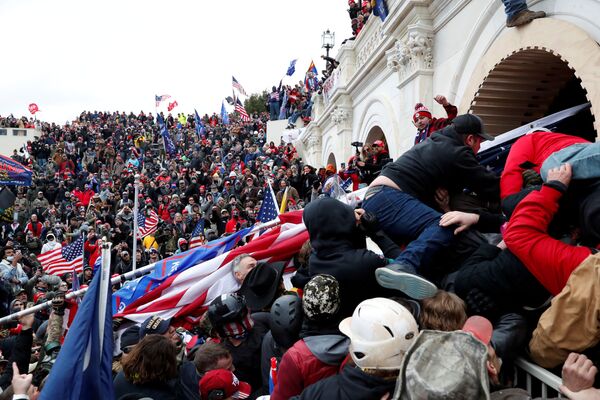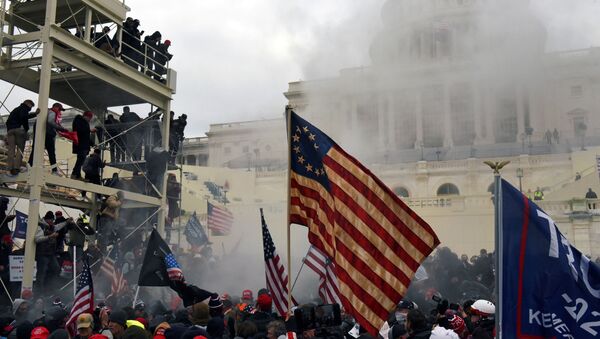The attack carried out by President Donald Trump’s supporters on the US Capitol on 6 January has reportedly galvanised a sweeping nationwide extremist movement that might present a long-term challenge to the incoming administration of President-elect Joe Biden, reports The Washington Post.
The legitimacy of the November 2020 presidential election – which has been called into question by the Republicans – may be wielded as a dangerous weapon for months and possibly years, claim US officials and independent experts, as they paint a gloomy picture of the aftermath of Trump's exit from the White House.

Authorities have been alerted to potential acts of violence at state capitols, as well as a possible second attack on the US Capitol in Washington, DC – or even on the White House – ahead of the inauguration slated for 29 January.
Law enforcement authorities have been monitoring online calls by protesters to rally in various cities beginning Sunday, and are primed to respond to extremists potentially armed with guns and explosives at the inaugural ceremony in Washington, DC.
FBI Director Christopher A. Wray earlier said that officials were monitoring “an extensive amount of concerning online chatter” linked to the inauguration.
“Right now, we’re tracking calls for potential armed protests and activity leading up to the inauguration,” he said.
Concerns of ‘Trump-Inspired Extremism’
Donald Trump, twice impeached after a vote by the US House of Representatives on 13 January – and ditched by social media platforms in the wake of his permanent Twitter ban – still exerts a powerful influence over his followers, who adhere to his notion that the 2020 election was "stolen" from him and "rigged" in favour of his Democratic opponent Joe Biden, claims Wray, cited by The Washington Post.
“It's begun to shift from ‘We are going to win this’ to ‘This fight is going to be a long one,’ ” Rita Katz, executive director of the SITE Intelligence Group, which monitors extremist groups, said.
While no further details have been revealed about the time or location of potential acts of violence, experts claim that even if they are put on hold in the immediate future, as they have reason to believe, the threat from what they perceive as "Trump-inspired extremism" is likely to grow.
“The prevalent consensus across the movements involved in or supporting the Capitol siege is that they will keep pushing forward.”
‘Opportunities for Violence’
Federal authorities are warning state leaders to be prepared for attacks across the country in the days before Biden’s inauguration.
New Mexico Gov. Michelle Lujan Grisham declared a state of emergency on 14 January, saying it was “reasonable to believe” that rioters “will endanger the safety of legislators, legislative staff, and the general public as well as destroy public and historic infrastructure” in the state.
Similar fears were voiced by Ohio Gov. Mike DeWine, who said that as a precaution, he had called up more than 400 National Guard troops and closed state offices in Columbus until 21 January.
“There are people in our country who want to turn peaceful protests into opportunities for violence,” he said at a news conference.
Now that Donald Trump is banned from Twitter, his supporters are not sure how to vent their anger during the final days of his presidency, claim experts, as social media platforms have also removed accounts and chat apps reportedly used to coordinate the Capitol assault.
Twitter also shut down more than 70,000 accounts affiliated with the conspiracy theory QAnon, believers of which are thought to have been involved in the recent riots.
It's been suggested that some pro-Trump events purportedly set to take place in Washington, DC and other state capitals have been canceled by the organisers, who fear federal authorities may use them to trap the president's followers.
A repeat protest in Washington, DC following the storming of the Capitol has apparently been shelved due to a massive security presence, with around 20,000 National Guard members expected to be deployed in the city, according to the D.C. police chief.
‘Extended Insurgency’
The news comes after a leaked FBI memo to law enforcement agencies reportedly warned them about the possibility of armed protests at state capitols from Saturday up until Inauguration Day.
First reported by ABC News, the memo is believed to have been based on information provided by the Bureau of Alcohol, Tobacco, Firearms, and Explosives; the Drug Enforcement Administration; the Defence Department; U.S. Park Police; and the U.S. Marshals Service, among other agencies, according to sources cited by the outlet.
New: @FBI now reports in a bulletin "Armed protests are being planned at all 50 state capitols from 16 January through at least 20 January, and at the US Capitol from 17 January through 20 January,” @AaronKatersky reports.
— Josh Margolin (@JoshMargolin) January 11, 2021
The report motivated state officials, including governors of Kentucky, Michigan, Minnesota, Ohio, and Wisconsin to share advice about how to confront a "dangerous period of extended insurgency" possibly targeting state and local governments.
Minnesota Gov. Tim Walz, who participated in joint calls with other Midwestern governors about the possibility of fresh violence on 13 January followed moves by governors in at least half a dozen states, including North Carolina, Ohio, Oregon, and Pennsylvania to activate National Guard troops amid fears of further unrest.




